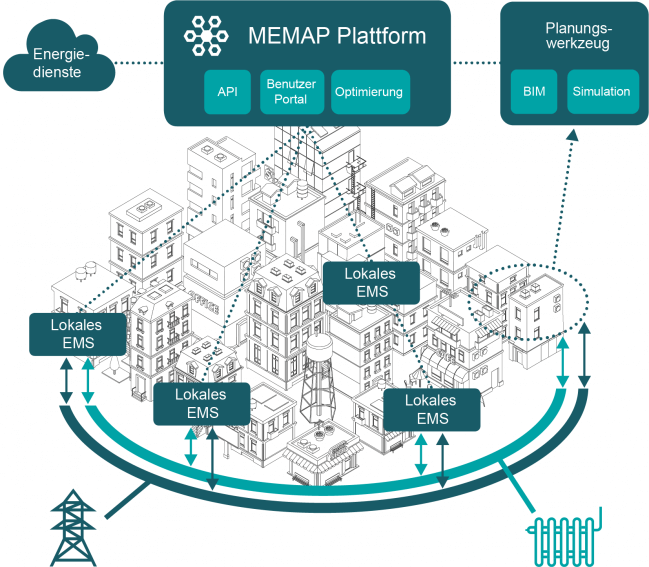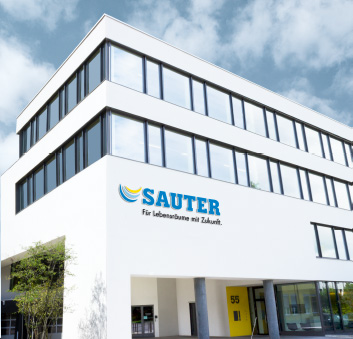Smart Cities – Tools for the creation of sustainable neighbourhoods
Smart Cities – Tools for the creation of sustainable neighbourhoods
The integration of renewable energies, heating and electricity storage as well as a continuous network are increasingly enabling cities to supply themselves with energy. The potential and feasibility of a promising solution are being tested by a current EU research project.
Software environment for regulation and control of sector building coupling
Climate change and the energy revolution are putting considerable pressure on the energy industry and calling for new solutions for the future. Increasing electrification, the expansion of decentralised energy supply and the rising fluctuation of power generation are pushing the current supply system to its limits, which can only be overcome with new solutions. In the future, the building sector is to increasingly supply itself with energy in the following ways:
- Integration of renewable energies
- Heating and electricity storage
- Continuous networking
Focus from single supply to neighbourhood solutions
The previous focus on the energy supply of individual buildings is now on neighbourhood solutions. Oversized systems, such as boilers, that operate uneconomically in partial load operation or cogeneration plants that are not operated continuously due to a lack of heating uptake, can be optimally utilised in a network. Together with other companies and research institutions, SAUTER is devoting itself to the development of an open software platform in a current EU research project. This new platform is intended to enable the planning and operation of neighbourhood solutions and thus act more efficiently and save energy.
MEMAP: Multi-energy Management and Aggregation Platform
The Multi-energy Management and Aggregation Platform (MEMAP) will make it possible to combine buildings with different energy requirements. This combination increases the energy efficiency.
The following steps take place at relatively short intervals and show how a real-time energy economy works:
- Intelligent optimisation processes and forecasts integrated into the platform react in real time to fluctuations in energy demand and generation.
- The MEMAP platform integrates control and regulation units in the individual buildings.
- The MEMAP platform knows the status of local energy producers and the required energy (short-term forecast), and based on this it prepares a schedule for optimal plant operation.
- The operating schedule considers individually adjustable factors such as economy and ecology.
- The local systems are enabled to switch on or off according to the schedule.
- Local producers may follow the recommendation, but this is not mandatory.
- If they wish to implement a different option, an alternative schedule is prepared. Thus, the producers benefit from great freedom.
Reduction of primary energy demand by 30%
Participants in the platform – producers and consumers – receive a transparent list from the system of the energy purchased or sold. Energy prices and emission factors of the individual producers are stored in the system. Overall, the aggregation platform is expected to reduce primary energy demand by 30%, with reduced operating costs. The verification of the potential savings and the operation of the platform is carried out in the COSES real laboratory at TU Munich. In an energy network of five buildings, the system can be put through its paces there before it is actually used in a commercial area.
As a leading provider of building automation systems, SAUTER uses the findings from the research project to further develop its own product and software solutions. Fast, secure communication and the processing of complex IT-controlled processes are key success factors.
Further information on the research project can be found at:
www.fortiss.org/en/research/projects/memap
About SAUTER
As the leading provider of solutions for building automation technology in Green Buildings, SAUTER ensures good climate conditions and a sense of well-being in sustainable environments. SAUTER is a specialist in developing, producing and marketing products and systems for energy-efficient total solutions, and offers a comprehensive range of services to ensure the energy-optimised operation of buildings. Our products, solutions and services enable high energy efficiency throughout the entire life-cycle of a building – from planning and construction through to operation – in office and administrative buildings, research and educational facilities, hospitals, industrial buildings and laboratories, airports, leisure facilities, hotels and data centres. With over 100 years’ experience and a track record of technological expertise, SAUTER is a proven system integrator that stands for continuous innovation and Swiss quality. SAUTER provides users and operators with an overview of energy flows and consumption, and therefore of the development of the costs involved.
The SAUTER Group
- Company active worldwide with headquarters in Basel, Switzerland
- Founded in 1910, it is built on more than 100 years of tradition and experience
- With more than 2,300 employees, it is present and active globally
- Complete building management solutions from a single source
Focus: maximum energy efficiency and sustainability - Investment protection and operational reliability over the entire building life-cycle
- Technology leader in the building automation and system integration sector
- Member of eu.bac, BACnet Interest Group (BIG-EU), BACnet International, EnOcean Alliance
- Excellent references available at sauterautomation.co.uk



